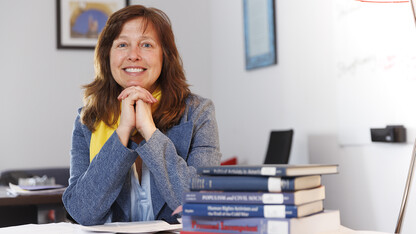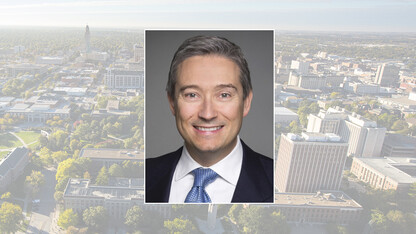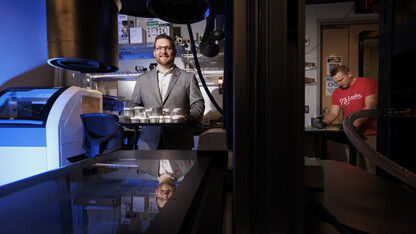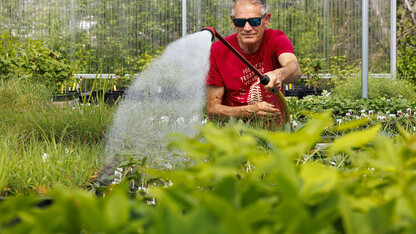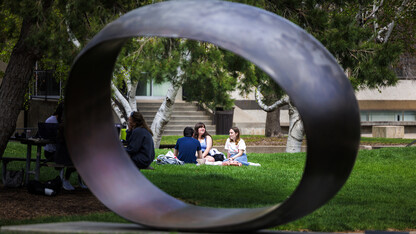· 7 min read
ASUN president, chancellor discuss COVID concerns, campus response
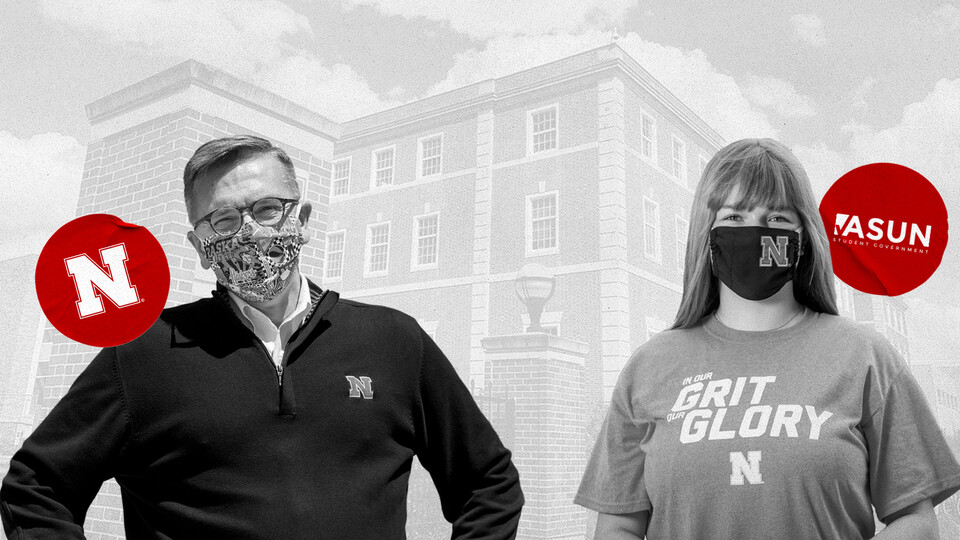
Each day, students, faculty and staff work together to ensure that in-person classes at the University of Nebraska–Lincoln remain a safe experience for all involved.
In that collaborative spirit, Roni Miller, president of the Association of Students of the University of Nebraska, sat down for a conversation with Chancellor Ronnie Green to ask her biggest questions about balancing in-person instruction, health protocols and the changing global pandemic.
Policy
What are the metrics for determining safety on campus in terms of potentially changing course like other universities across the U.S.? What could some of those changes to increase safety look like?
The University of Nebraska–Lincoln works in partnership with medical experts, plus state and local health officials, to determine whether or not it is safe for our campus and surrounding community to continue to offer in-person instruction. A few factors that would be considered include: COVID-19 outcomes on campus and within surrounding communities; capacity limitations for testing, isolation, quarantine and health care; and absence of employees needed to provide services and operations in the areas of safety, health, dining and housing. Here is the link to the operational status page for more information, https://covid19.unl.edu/campus-operational-status.
What is one thing you think we, as a university, could do a better job of? What steps are you actively taking to address that shortcoming?
In classrooms, labs and studios, are all doing a great job of following the protocols of wearing a mask, maintaining safe distance and washing hands and surfaces. That needs to continue and extend beyond the classroom to other campus and off-campus activities. We all need to make sure we are as vigilant off campus as we are on campus. Most in our university community are doing their part, but it takes all of us. It can’t be stressed enough that these health and safety guidelines or protocols are about protecting others and minimizing the spread of COVID-19.
Especially compared to other universities, what is something you feel the university has done well and needs to continue prioritizing?
Based on our testing and contract tracing, LLCHD has not seen any evidence of classroom-based transmission on our campus. Nor have we seen large outbreaks linked to a single residential unit, event or academic building. It was a herculean task for our faculty and staff to prepare for this fall semester, and all the work that went into it is paying off. Of course, that work didn’t end on Aug. 17 when classes began. In other words, the work of maintaining distanced classroom space continues, as does the work of living up to our Cornhusker Commitment for each of us on and off campus. Also, with free testing available on campus, I encourage everyone in our campus community to get tested.
What is your biggest worry about campus at its current state?
We have done fairly well as a university community to this point. My hope is that we all see the benefits of our efforts and continue to practice our safety measures consistently — on and off campus, indoors and out. So, I worry about fatigue, about people getting tired of taking these safety measures or getting a false sense of security and letting their guard down. We’ve been very fortunate to avoid any large outbreaks, but it just takes one event where people aren’t practicing these safety measures to generate a large number of cases that spread throughout the Lincoln community. I worry about people letting their guard down for a night in a crowded bar or at a big party — about wearing masks, keeping safe distances and washing hands — because I know this virus does not rest. If we can all be diligent and continue to work together toward our incredibly important goal, we can preserve our ability to learn and safely engage with one another on our campus.
Perspective-based
What are the benefits of being in-person? Why was this a focus for planning the return to campus this fall?
In-person classes are the most equitable opportunity for every UNL student (for example, consider the challenges some students may face accessing WiFi off campus) to engage in learning and make progress toward their academic goals. Our students feel strongly about being on campus, and we know the value of being on campus, of being in that learning environment, is so high and students have been clear with us that they definitely prefer that.
How can student leaders support the following of COVID-19 policies in their roles on campus?
Wearing a mask and maintaining social distance — modeling those public actions is important. It matters on campus, and it matters just as much off campus. These responsible actions we’re all committing to can only be effective if we’re performing them each time we come into contact with other people outside our homes. The spread of COVID-19 will not take a break just because it seems like a fun night to go out.
Sharing with your fellow students in person and on social media how you are committed to the policies is helpful, too. And, as we all recognize, managing through pandemic isn’t the first choice for any of us, but it’s what we have to do this year, so self-care is important and so is supporting each other and lifting each other up when we can.
What has been the most challenging aspect of leading the university through this pandemic?
I think it’s just knowing that everyone — every student, and member of the faculty and staff — is bearing an extra burden. We’re all carrying a heavier load this year. It’s inspiring that we’re working through it together. Just as it’s so important for each of us to do what we can in terms of following our COVID-19 policies, it’s also important to give grace and goodwill to ourselves and each other.
What is the most important piece of advice for students on campus this semester?
I can’t say it enough: Wear a mask, inside and out, on campus and off campus. Maintain social distance. Get tested — testing is available, free and on campus. And of course, wash your hands.
Topics of interest
After the Big Ten announcement to resume the football season in October, how does that impact the delivery model of classes for the university? What does the return to playing football this fall mean for student life on campus?
We don’t anticipate that the return to playing football will impact the delivery model of classes.
What defines incidents of temporary suspension for organizations in relation to COVID-19 regulations? What was taken into account for the recent temporary suspension of various Greek houses?
Violating local COVID-19 health directives, university policies and the Cornhusker Commitment. In the recent temporary suspensions of Greek houses, the reports we received, including photos and videos, depicting large gatherings on the house properties without face coverings or physical distancing were important factors.
Special attention has been paid to the toll COVID-19 is taking on students’ mental health. Explain what this means for you in your position and the resources UNL has available for students.
We are all carrying a heavier load as we lead our lives during this pandemic. While that is common among us, we each face unique challenges and experience life differently, so I am aware of the variability in needs among our students. I want students to know the university has resources and support available.
• An on-demand presentation on Coping with COVID-19 is available from Big Red Resilience and Well-being.
• Counseling and Psychological Services offers a variety of supports to our students. If you’re not sure how to start the conversation, they offer “Let’s Talk,” a program that provides easy access to brief, informal, and confidential consultations with professional mental health providers from CAPS at no cost to our students.
• Student Affairs offers support in how to request additional flexibility from professors if needed.
